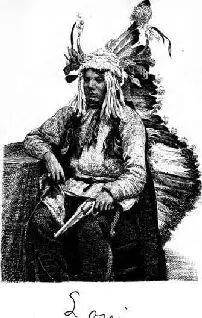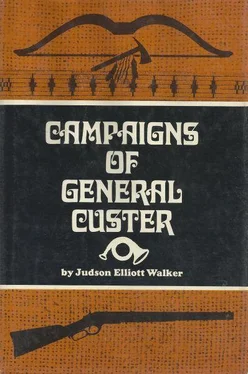Walker Array - Campaigns of General Custer in the North-west, and the final surrender of Sitting Bull
Здесь есть возможность читать онлайн «Walker Array - Campaigns of General Custer in the North-west, and the final surrender of Sitting Bull» весь текст электронной книги совершенно бесплатно (целиком полную версию без сокращений). В некоторых случаях можно слушать аудио, скачать через торрент в формате fb2 и присутствует краткое содержание. Жанр: Историческая проза, Исторические приключения, Приключения про индейцев, на английском языке. Описание произведения, (предисловие) а так же отзывы посетителей доступны на портале библиотеки ЛибКат.
- Название:Campaigns of General Custer in the North-west, and the final surrender of Sitting Bull
- Автор:
- Жанр:
- Год:неизвестен
- ISBN:нет данных
- Рейтинг книги:5 / 5. Голосов: 1
-
Избранное:Добавить в избранное
- Отзывы:
-
Ваша оценка:
- 100
- 1
- 2
- 3
- 4
- 5
Campaigns of General Custer in the North-west, and the final surrender of Sitting Bull: краткое содержание, описание и аннотация
Предлагаем к чтению аннотацию, описание, краткое содержание или предисловие (зависит от того, что написал сам автор книги «Campaigns of General Custer in the North-west, and the final surrender of Sitting Bull»). Если вы не нашли необходимую информацию о книге — напишите в комментариях, мы постараемся отыскать её.
Campaigns of General Custer in the North-west, and the final surrender of Sitting Bull — читать онлайн бесплатно полную книгу (весь текст) целиком
Ниже представлен текст книги, разбитый по страницам. Система сохранения места последней прочитанной страницы, позволяет с удобством читать онлайн бесплатно книгу «Campaigns of General Custer in the North-west, and the final surrender of Sitting Bull», без необходимости каждый раз заново искать на чём Вы остановились. Поставьте закладку, и сможете в любой момент перейти на страницу, на которой закончили чтение.
Интервал:
Закладка:
Crow King said that if Reno had held out until Terry and Gibbon came and then fought as Custer did, they would have whipped the Indians. The Indians would then have T›een compelled to divide to protect their women and children, and the whites would have had the advantage. He expressed great admiration for the bravery of Custer and his men, and said that that fight impressed the Indians that the whites were their superiors, and it would be their destruction to keep on fighting them. Both he and Low Dog said they did not feel that they would be blamed for the Custer fight or its results. It was war ; they were attacked; Custer tried to kill them ; they killed him. Crow King said he had two brothers killed in the fight; from 30 to 50 Indians were killed, and a much larger number who were wounded died afterward.
Upon the opposite page appears a life likeness of " Louis,'* a son of Chief Sitting Bull, about twenty-three years of age, and through the kindness of young C. K. Peck, Jr., whose father was an old Indian trader, we are permitted to take a "fac simile " of his signature, which was secured from Louis while he was en route from Fort Buford to Standing Rock, early last spring, on the steamer "General Terry." He also wrote his wife's name, Zuzela, as will also be noticed.
After Louis was surrendered to Major Ilges last winter, he rendered almost invaluable service to that officer in" the way of giving information and acting as a mounted scout, and it is possible he may remain quiet and continue his good services to the government; and it is just as possible he may skip out with a marauding band of discontented braves and join a small war-party. He will, however, be influenced in a great measure by the leading chiefs, also by Sitting Bull himself.
The writer places these autographs before the reading public merely to show that the average class of Indians of both sexes, below fhe age of say twenty-five, are, in a great measure to be considered yet in the hands of the military, the philanthropists and teachers.
It will readily be seen that the untutored children of the forest will no doubt make very marked progress in our elementary branches of study, with proper encouragement and good moral training. The younger class, say below the age above mentioned, are generally quite ingenious and apt in learning, and those that have not been wholly demoralized by the older warriors and leading chiefs, there are strong hopes of fair to good results in trying to educate them. We are frank to state that, from our own personal knowledge, we are able to say that there is a very general and marked improvement, which already shows the

results of the so very persistent, but generous philanthropists and teachers, who have so bravely stemmed the tide of opposition all along the frontier. As is already shown at the various Indian agencies, there are numerous classes of half and full grown Indians of both sexes, who are quite well advanced in reading and writing, and as they grow older they seem to take quite an interest in farming and stock raising, and we must say with considerable less reluctance than many of our white brothers, after taking the-advice of the veteran Horace Greeley to " go West, young^ man, go West."
While writing this article, we beg to state that in turning our eyes to the left, and looking out of a certain window in Printing House Square, we gaze upon the scene of the life labors of Horace Greeley, (the Tribune building), the moral adviser to the young men of the country, as well as the old, and just now imagine if his voice could be heard from beneath the sepulchre, he would speak in louder tones than ever, " Young man, go West," but don't forget what to do when you get there.
As to the philanthropists and teachers who have paved the way into the Indian country, and have made such commendable strides toward educating the red men of the plains, we can only say that they are, to say the least, entitled to a-vote of thanks from the country at large, and should be not only encouraged by the Government, but well paid for their services. There is no longer any doubt as to the final success of their workings and teaching, both morally and physically.
CHAPTEE IV.
Sitting BuWs frst visit to a white man } s city – Bismarck. – On
the steamer " General Sherman"
Sitting Bull's visit to Bismarck was anything but satisfactory to him, more particularly on account of being deprived of visiting the residence of Captain William Harmon. It will be remembered that this was the first white man's town or city that Sitting Bull was ever in, and he certainly was entitled to respectful treatment. It appears that Mrs. Harmon's mother, Mrs. Galpin, was an old acquaintance of his, many years ago, and he has known for years that her daughter married Captain Harmon.
As soon as the steamer landed, Captain Harmon started in his carriage, taking Mrs. H. along as far as the church, and then proceeded, with one of his little sons, to the boat. The chief was more than glad to see him, and after the usual " hearty shake, and how," the captain then said, " This is my second son;" to which the chief replied, " I am poor, and have nothing to give you, only my name," taking the hat from the boy's head and writing his name quite plainly on the inside, and said, " if I had anything more to give, I would give it to you ;" and then said to the captain, " you ought to bring your wife down to the boat," saying he had known her mother for many years. The captain said he had left her at church, but as he was going straightway home, he would take her along; and when he, the chief, came up into the city, he wanted him to come to his residence ; to which the chief replied, that he would be glad to come, and would do so, if they would let him. But it appears his wish was not granted, for reasons known only to those who had him in charge, and prevented him from going there.
Captain Harmon, upon arriving at his house-a richly furnished mansion in the suburbs of the city-together with his accomplished and queenly wife, set themselves about preparing a lunch, such as sandwiches, lemonade, etc., etc., and thereupon waited the arrival of the " chief." The parties in charge of the reception, however, thought best not to allow him to go there, for reasons not by them explained, and at the same time not showing even a faint disposition to care anything about the personal wishes of " Sitting Bull"
The chief felt very much disappointed, as well as deeply mortified at this chagrin, and Mrs. Harmon was at once sent for. Upon her arrival on board the steamer " General Sherman," the usual " shake and how," as a matter of course, came first, and the chief was indeed glad to see Mrs. H. The chief had known her mother since his bovhood, and he seemed to act and talk very free-inquiring about many things that had transpired within the past few years in that section of the country, and expressed himself as perfectly satisfied with her answers and explanations.
The good lady said to him, " Don't you think it would have been better for you and your people if you had come in and surrendered in 1867, as you were told to do ?" To which he answered, " Yes, I think it might have been better, but as me and my people was born in this country, I always considered it belonged to me, and do yet; and I never would have come in, only for the sake of my women and children, and did not come in because I wanted to."
Mrs. Harmon speaks the Sioux language fluently, and the chief knew that she was one among only a very few white ladies in the world that can speak and understand his language in all its phases. In the early days of the chief he learned the French language to quite an extent from " French traders " that visited his section of the country for the purpose of trading, and who generally came from the British possessions.
Читать дальшеИнтервал:
Закладка:
Похожие книги на «Campaigns of General Custer in the North-west, and the final surrender of Sitting Bull»
Представляем Вашему вниманию похожие книги на «Campaigns of General Custer in the North-west, and the final surrender of Sitting Bull» списком для выбора. Мы отобрали схожую по названию и смыслу литературу в надежде предоставить читателям больше вариантов отыскать новые, интересные, ещё непрочитанные произведения.
Обсуждение, отзывы о книге «Campaigns of General Custer in the North-west, and the final surrender of Sitting Bull» и просто собственные мнения читателей. Оставьте ваши комментарии, напишите, что Вы думаете о произведении, его смысле или главных героях. Укажите что конкретно понравилось, а что нет, и почему Вы так считаете.












